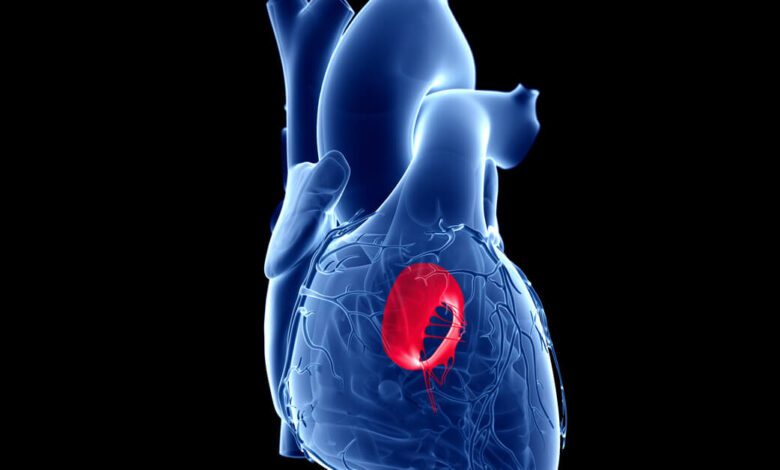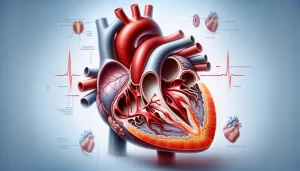Mitral valve prolapse.. Have you heard of this condition before?

1
You may panic just by hearing the doctor’s diagnosis of a heart problem, but your anxiety and discomfort may be unnecessary, as the matter is not as serious as those serious expectations. Although the condition we are discussing now, which is mitral valve prolapse, may not represent a major problem like serious health problems in the heart such as heart attacks and hardening of the arteries, we will provide you with more details about this medical condition in detail. Follow us
mitral valve prolapse


mitral valve prolapse
First, we must know that the heart valve performs a vital function in regulating and directing the blood flow process in the correct direction inside the heart. It is obvious that if there is a malfunction in the performance of this function, this will negatively affect your blood circulation. Since we are talking about the mitral valve, which is one of the most important heart valves, and which is sometimes exposed for one reason or another to regurgitation.
What is meant by mitral valve regurgitation?


mitral valve prolapse
You may have heard before about the condition of esophageal reflux as one of the common digestive disorders that are associated with the reflux of stomach acid into the esophagus, which causes the person to suffer from heartburn and burning pain in the chest, but this time the matter is related to heart health. Since the heart consists of four valves: the mitral valve, the pulmonary valve, the tricuspid valve, and the aorta, it is possible that one of them will suffer from what is called reflux or relaxation, so that blood flows backwards in the valve. This may be due to part of it being closed or not being tight enough.
According to the precise anatomy of the heart, the mitral valve is located between the two chambers of the heart, represented by the left atrium and the left ventricle. Its function in normal, healthy cases is to control the return of blood from the ventricle to the atrium, where it plays the role of a controller. However, in other cases that indicate a problem, it is unable to perform its function, which causes the blood to be subject to regurgitation in the opposite direction to the heart, which constitutes more pressure on the heart. The matter may develop in advanced stages with the return of blood flow to the lungs.
Read also: Broken heart syndrome.. Symptoms similar to an acute heart attack
Causes of mitral valve regurgitation


Causes of mitral valve prolapse
Regarding the reasons responsible for a person suffering from mitral valve regurgitation, more than one possible reason has been identified as follows:
- Mitral valve prolapse is caused by the softness of one of the anterior and lower leaflets. It is also called the “pinching” or “snapping” syndrome.
- Suffering from rheumatic heart disease caused by a bacterial infection caused by a type of streptococcus bacteria
- Coronary artery disease or heart attack risk factors
- Immune disorders, such as: autoimmune rheumatic diseases
- Endocarditis is an inflammatory infection caused by bacteria and fungi in the inner lining of the heart valves.
- The patient had a congenital mitral valve problem since birth.
- Mitral valve tissue tears
- The heart muscle, which is responsible for pumping oxygenated blood to different parts of the body, is weakened, affecting its function.
- The cause may be related to the side effects of taking certain types of medications.
- Blood pressure reaching high levels
It should be noted that during pregnancy, a woman may suffer from valve regurgitation, which involves blood flowing in the opposite direction to its normal direction, causing her to suffer from difficulties during childbirth. This in turn increases the severity of coughing and breathing difficulties, in addition to the feeling of excessive fatigue.
Symptoms of mitral valve regurgitation


Symptoms of mitral valve regurgitation
This medical problem varies in severity from mild to moderate, but as the disease develops and progresses, some symptoms begin to appear, including:
- Heart murmur: a type of abnormal heart valve malfunction that appears as fluctuating sounds coming from the heart that the doctor hears using a stethoscope.
- Respiratory difficulties that lead to a feeling of shortness of breath and increase in intensity with exertion or adopting lying positions
- Feeling weak and generally unwell
- Severe attacks of chronic headache
- Increased coughing at night or lying on a chair or couch
- Acceleration of the heart rate and palpitations, leading to a feeling of rapid heartbeats
- Swelling of the feet, ankles, or abdomen
- Frequency of urination over and over again
- Acute and chronic chest pain
Severe cases of mitral valve regurgitation are associated with the progression of the disease and its taking on a more serious form, leading to health complications, most notably heart muscle failure, which disrupts its ability to pump blood properly, or atrial fibrillation, which is a form of heart rhythm disturbances, or pericarditis associated with the thin membrane surrounding the heart, or pulmonary hypertension.
Diagnosis of mitral valve regurgitation


Diagnosis of mitral valve regurgitation
When talking about the diagnostic procedures for mitral valve prolapse, the doctor conducts a medical examination to verify the normal heart rate and that the sound heard does not contain any suspicious cases indicating a problem, which proves the presence of mitral valve regurgitation and excludes the presence of other causes. The doctor can resort to several diagnostic methods:
- Planning Electricity the heart to observe Discipline the heartIt is a device that records the electrical activity of the heart. It is one of the types of tests commonly used by doctors to detect heart problems.
- Echocardiography, also known as ultrasound imaging of the heart, is used to measure the degree and severity of heart valve regurgitation.
- a test stress the heart :Sometimes it becomes necessary to conduct a stress test, which is concerned with measuring the response of the heart during physical activity. It involves the patient walking on a device with several wires connected to the device placed on his chest, while at the same time monitoring breathing levels and rates and blood pressure indicators.
- Photography By resonance Magnetic: A type of imaging test in which a specific device attached to a high-powered magnet is used to obtain internal images of the body, and a set of sequential images based on radio frequencies appears on the computer.
- Catheter the heartOne of the treatment methods for medical problems affecting the heart and blood vessels, such as atherosclerosis and irregular heartbeats.
Treatment options for mitral valve regurgitation


Treatment options for mitral valve regurgitation
The doctor’s choice of treatment method for mitral valve regurgitation depends on the main cause, the type of regurgitation, and its severity, in addition to the general health of the body. For early cases of the disease in its initial stages, which are not accompanied by complaints or discomforts that leave a feeling of distress and discomfort in the patient, treatment may not be required, but regular periodic visits and follow-up by the doctor will suffice. The most prominent examples of the common drug classes used as treatments to control cases of mitral valve regurgitation are:
- Angiotensin-converting enzyme inhibitors (ACEIs) and beta blockers. This type of drug therapy helps reduce the intense stress on the heart.
- Your doctor may recommend certain medications to regulate your heart rate.
- Another treatment option is diuretics, which have medicinal properties to reduce fluid retention in the body.
- Anticoagulants that slow down blood clotting factors, which helps prevent blood clots.
As for patients who have suffered from severe mitral valve prolapse that may occur suddenly, the doctor may prefer surgical procedure as a type of correction of the mitral valve and repair of the defect that occurred in it or its replacement.




